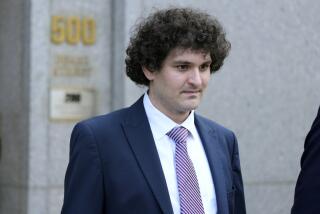Investment Scammer Sentenced to 20 Years
- Share via
A Northridge man was sentenced to 20 years in prison Monday for running a bogus currency-trading operation that defrauded hundreds of investors out of more than $95 million.
Moshe Leichner, 56, pleaded guilty in 2003 to two counts of wire fraud and one count of money laundering in connection with the scam, as did his son, Zvi Leichner, 33, of Bell Canyon. Both have been in federal custody ever since. Zvi Leichner, who will be sentenced April 4, also could be sentenced to a maximum term of 20 years in prison, prosecutors said.
U.S. District Judge John F. Walter in Los Angeles also ordered Moshe Leichner to pay more than $94 million in restitution to 296 victims.
Authorities have seized some of the Leichners’ assets, including cars, houses and cash, said Thom Mrozek, a spokesman at the U.S. attorney’s office in Los Angeles. The government’s financial litigation unit will now try to find and repatriate millions of dollars that prosecutors believe the Leichners have deposited overseas, Mrozek said.
The Leichners ran Midland Euro, a currency-trading company in Sherman Oaks that solicited customers via the Internet, according to the U.S. attorney’s office. Promising returns of 2% to 4% a month, Midland took in $130 million over a five-year period from investors in the U.S., Canada, Saudi Arabia and Israel.
Investors were told that their money would be placed in foreign currencies and traded for profit, but that a substantial amount of their principal -- between 40% and 85%, depending on the investor -- was guaranteed against loss.
In reality, only about 20% of the money was ever invested, prosecutors said, with most of it going to the Leichners.
The Leichners cloaked the scam by providing victims with falsified statements indicating that invested money was on deposit with various financial institutions, the government said.
The National Futures Assn. audited Midland in October 2001 and subsequently barred the Leichners from the commodity and currency trading businesses. However, they continued to solicit sales until Midland was shut down in February 2003, Mrozek said.
More to Read
Inside the business of entertainment
The Wide Shot brings you news, analysis and insights on everything from streaming wars to production — and what it all means for the future.
You may occasionally receive promotional content from the Los Angeles Times.










